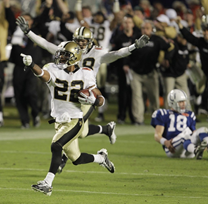WHO DAT! WHO DAT! WHO DAT SAY THEY GOING TO BE THOSE SAINTS! February 17, 2010 when the New Orleans Saints won the Super bowl. I remember Tracy Porter taking a pic 6 to the house and all New Orleans cheering him on. That moment was bigger than football. That day not only did the Saints win the Super bowl, but the entire city of New Orleans as well. What iconic sports moment do you remember? Where were you when it happened? What did it mean to you? Let us know!
- The 'Immaculate Reception'
The second-greatest American sports moment involved a play that didn’t just win a game. It changed a franchise forever. On Dec. 23, 1972, the Pittsburgh Steelers hosted the Oakland Raiders in the AFC divisional playoff game. To that point, the Steelers had endured four decades of losing, with only nine winning seasons. This was the franchise that drafted hometown boy Johnny Unitas in 1955 and then cut him after never giving him one practice snap. That didn’t work out so well.
The Steelers, looking for their first ever playoff win, trailed Oakland 7-6 with 22 seconds left and the ball on their own 40-yard line. With no timeouts left, it looked like the same old, same old for the Steelers.
Quarterback Terry Bradshaw threw downfield to running back John “Frenchy” Fuqua at the Raiders’ 35-yard line. The ball and Oakland safety Jack Tatum arrived at Fuqua at the same time.
The ball bounced away, and the game seemed to be over until the Steelers’ Franco Harris grabbed it and ran into the end zone, giving Pittsburgh a 13-7 win. With that, we had the “Immaculate Reception.”
The first controversy over the play involved a rule that said a tipped ball couldn’t be tipped directly from one offensive player to another. It had to hit a defensive player. Most who saw the play seemed to think that Tatum definitely touched the ball and Fuqua might not have.
The second controversy was whether Harris caught the ball before it hit the ground. There has never been a camera angle that gives a good enough view to really tell.
The Steelers lost the following week to the eventual undefeated Super Bowl champion Miami Dolphins. But they went on to win four Super Bowls in five years later in the decade. They’ve since won two more and lost two.
After those 40 years of losing, the Steelers have only had back-to-back losing seasons twice, and they have never had three straight losing seasons.
- 'Do You Believe in Miracles? Yes!' The most amazing moments result in you remembering exactly where you were at the time. What you saw. What you heard. As if it was yesterday, even though you know it was 32 years ago. I was in the Ira S. Wilson Ice Arena on the campus of the State University of New York at Geneseo on Feb. 22, 1980. As we watched the Ice Knights, the PA announcer, Kevin Smith, kept us up to date on the USA-Soviet Union Olympic hockey game.
The last update had the Soviet Union up 3-2 at the end of the second period. Then Smith broke in to tell us the game had gone final. The arena fells silent. The game waited.
“The Soviet Union 3"—we all assumed the worst—”the USA 4!”
The explosion was immediate and thunderous. It will never be forgotten.
That game changed sports for me forever. No matter how much one team is favored over the other, I know the upset can happen. The miracle.
Coach Herb Brooks’ comments at the end of the movie Miracle are so true: “A few years later, the U.S. began using professional athletes at the Games: Dream Teams. I always found that term ironic because now that we have Dream Teams, we seldom ever get to dream.”
Men among boys? This game is where that concept originated. The Soviet hockey team was made up of grown men, the best hockey players in the world. They had won the Olympic gold in 1964, 1968, 1972 and 1976. During that run, they went 27-1-1 and outscored the opposition 175-44.
In 1979, they beat the NHL All-Stars, 6-0. Prior to the Olympics, they went 5-3-1 against NHL teams. Goalie Vladislav Tretiak, forward Valeri Kharlamov and defenseman Viacheslav Fetisov would end up in the Hockey Hall of Fame.
The USA team was made up of boys—college players from Minnesota and Massachusetts. Buzz Schneider was the only player on the team with previous Olympic experience. A stark contrast to the veteran Soviet Union team.
On Feb. 9, only 13 days before the miracle, the Soviets beat the USA, 10-3, in a pre-Olympic exhibition. Coach Brooks before the medal-round game: ”If we played ‘em 10 times, they might win nine. But not this game. Not tonight.” With exactly 10 minutes left in the third period and the game tied at three, the greatest moment in sports history happened.
The moment is magical in large part because of its unlikely hero. Mike Eruzione may have been the captain of this team, but he was also considered one of its weakest players.
His leadership was unquestioned, so much so that Brooks reportedly asked him to be an assistant coach since it looked like he wouldn’t make the team. Eruzione turned him down and then rewarded Brooks’ decision to keep him on the team with the biggest goal in hockey history.
And there’s been no better call in the history of sportscasting…
“11 seconds, you’ve got 10 seconds, the countdown going on right now! Morrow up to Silk, five seconds left in the game. Do you believe in miracles?! YES!” Chills.

Source: http://www.bleacherreport.com/articles/1382785-the-top-ten-greatest-sports-moments-of-all-time